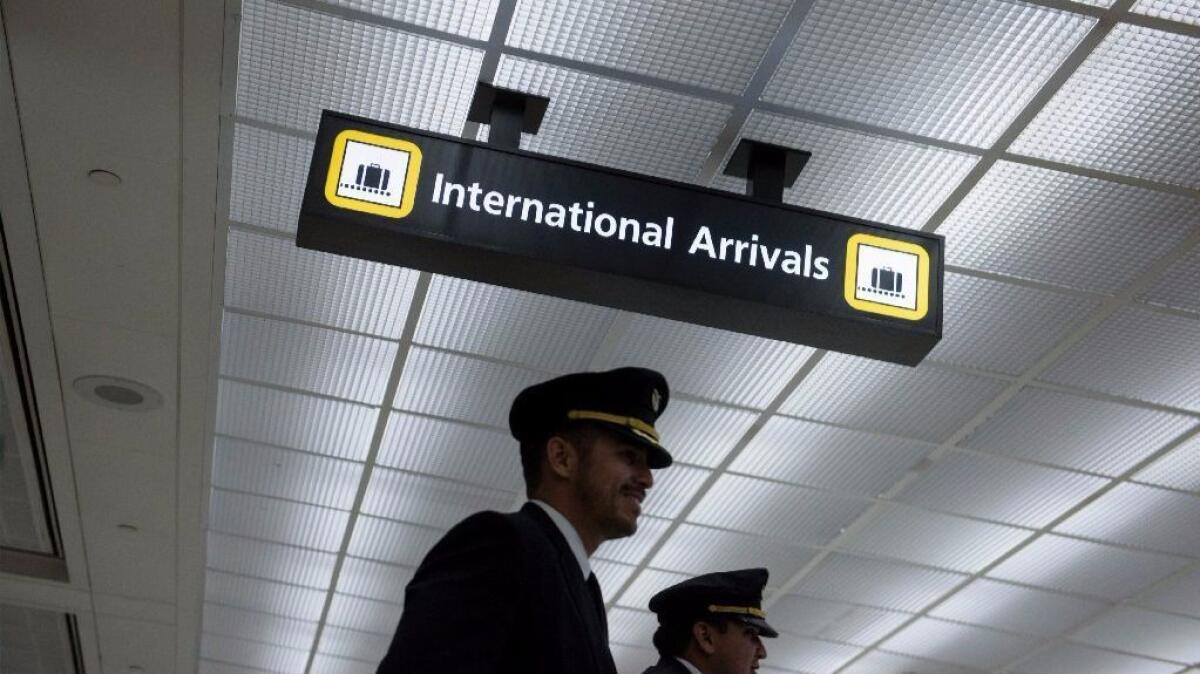What we know about the electronics restrictions on some foreign flights

Travelers from several Muslim-majority countries found out Tuesday that they won’t be allowed to bring most electronic devices into the cabin on direct flights to Britain, which issued a directive similar to the one sent Monday by U.S. officials to nine foreign airlines.
U.S. and British authorities had been “in close contact” in crafting their restrictions, British officials said in banning devices larger than the average smartphone from in-flight use or from carry-on bags.
Here’s what is known so far about the new rules:
What prompted the moves?
U.S. officials cited new intelligence information about terrorist threats. British officials also cited intelligence reports.
In announcing the restrictions, the Department of Homeland Security said that “our information indicates that terrorist groups’ efforts to execute an attack against the aviation sector are intensifying,” adding that “terrorist propaganda has highlighted the attacks against aircraft in Egypt with a soda can packed with explosives in October 2015, and in Somalia using an explosives-laden laptop in February 2016.”
U.S. officials would not comment on why checking an electronic device in the cargo compartment is safer than carrying it in the cabin.
What countries are involved?
The U.S. order affects direct flights to the U.S. from 10 airports in eight countries: Jordan, Egypt, Saudi Arabia, Qatar, Kuwait, United Arab Emirates, Turkey and Morocco.
The British government said it was banning large electronic devices from airplane cabins on flights to Britain from Jordan, Egypt, Saudi Arabia, Turkey, Lebanon and Tunisia.
What devices are being banned?
The U.S. will prohibit passengers from carrying on laptops, electronic tablets, e-readers, electronic cameras, portable DVD plays, travel printers and scanners as well as electronic gaming units that are larger than a smartphone.
An unusually large smartphone might be a problem under both the U.S. and British rules. Passengers are urged to check with their airlines.
Passengers will be allowed to place their electronics in checked luggage. Medical devices will be allowed in the cabin after they have been screened.
Is Los Angeles International Airport involved?
Yes. There are four direct daily flights and two three-times-a-week flights to LAX from these countries.
The daily flights originate at Abu Dhabi International Airport, Dubai International Airport, Qatar’s Hamad International Airport and Turkey’s Istanbul Ataturk Airport. The other flights originate at King Abdulaziz International Airport and King Khalid International Airport, both in Saudi Arabia.
In all, the affected foreign airlines operate about 50 daily flights to the U.S., officials said.
When do the rules take effect?
The airlines must implement the new restrictions by Saturday morning.
How long do they last?
U.S. officials gave no end date for the new rules but said they would be reviewed periodically.
What airlines are affected?
The U.S. ban affects nine airlines: Royal Jordanian, Egyptair, Turkish Airlines, Royal Air Maroc, Saudia Airlines, Kuwait Airways, Qatar Airways, Emirates and Etihad Airways.
No U.S. airlines are involved because they don’t offer direct service to the U.S. from the targeted airports, U.S. officials said.
To read more about the travel and tourism industries, follow @hugomartin on Twitter.
More to Read
Inside the business of entertainment
The Wide Shot brings you news, analysis and insights on everything from streaming wars to production — and what it all means for the future.
You may occasionally receive promotional content from the Los Angeles Times.











